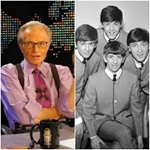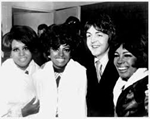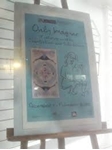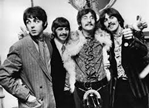- Register
- Log in to Tune-In
- Wishlist (0)
-
Shopping cart
(0)
You have no items in your shopping cart.
Beatles News

Rare guitars used by musicians including George Harrison, Bono and Tom Petty are going under the hammer for charity.
Hundreds of items from the famed instrument manufacturer Gretsch’s archives will be up for auction for the first time, including prototypes played by leading industry figures. All funds from the Julien’s Auction sale will go towards the Gretsch Foundation.
Highlights include a Silvertone Danelectro guitar owned by former Beatle Harrison and rockstar Petty and given as a gift to Fred Gretsch in 1987.
The instrument, a prototype of supergroup Traveling Wilburys’ Gretsch guitar line, is expected to fetch between £14,600-£29,200.
A Gretsch prototype of U2 star Bono’s Irish Falcon Model 6136 electric guitar complete with green finish and the words “The Goal is Soul” on the pickguard has a guide price of between £5,800-£7,300.
A Historic Series G3100 acoustic guitar signed by the revered folk singer John Prine is predicted to sell for between £511-£658. Prine, a contemporary of Bob Dylan, died in April last year aged 73 after contracting Covid-19.
Other highlights include a 1964 Grets details

Legendary radio and television host Larry King’s death this weekend at age 87 has us looking anew at the hour-long, nightly interviews on CNN for which he was most famous.
King simply sat across a desk, one on one with his guest, and asked the short, agreeable questions he was known for that reflected his innate curiosity.
Inevitably, the broadcaster would get his visitor – whether celebrity, politician, sports figure, or even convicted criminal – to open up perhaps even more than they themselves had intended.
King revealed in 2010 the chat that permanently changed his negative view of the English rock band The Beatles.
Source: cheatsheet.com
details
From the very beginning, a big part of The Beatles appeal was visual. In his book The Art of The Beatles, Mike Evans explained, “their image was always unique. Unlike their contemporaries on the music scene, whose style reflected the times, The Beatles invariably helped to establish fashion.” From their pre-fame days, they always had a look – uniform, in every sense. When they first emerged, the press was obsessed with their mop-top haircuts, their matching Cuban-heeled boots, their collarless jackets. How they presented themselves was vital to what made them so… different. And nowhere was this reflected more consistently than on their record covers. Photography, illustration, graphic design – Beatles album covers changed them all.
Before The Beatles, album art was designed to sell the contents – song titles and sales messages on top of the artist’s bright image. But within a few short years, The Beatles album covers were works of art in their own right. Images such as the half-lit heads on With The Beatles, the psychedelic nostalgia of Sgt. Pepper’s Lonely Hearts Club Band, and the simplicity of crossing Abbey Road rank as some of the most influential and enduring art of details

"I think you just cut your first number one," Lennon told Ono during their 1980 recording session
Along with "Give Peace a Chance" and "Imagine," "Walking on Thin Ice" holds a vaunted place among the collaborative works of John Lennon and Yoko Ono. Indeed, it would be the final, poignant act in the story of their remarkable artistic association.
Composed by Ono, "Walking on Thin Ice" began to take shape for Yoko during one of the Lennons' car trips between their estate in Cold Spring Harbor and New York City's Dakota apartment building. After writing the song's ethereal lyrics, Yoko challenged herself to concoct an ambitious new sound to bring the composition's music to fruition. "I wanted to push it a little further, experimentally," she later recalled. "So I was thinking about Alban Berg, in one of his oper
s, you know, where a drunk is going 'ahaahaahaa.' Just sort of saying things, but in such a way that the emphasis is all wrong, distorted" (Madeline Bocaro, "Just a Story: 'Walking On Thin Ice,'" December 8, 2016).
Source: Kenneth Womack/salon.com

The Supremes and The Beatles are two of the most iconic groups to come out of the 1960s. Each group topped the charts and toured the world. This raises an interesting question – did The Supremes and The Beatles ever meet? And if they did, what happened?
Firstly, a little background. AllMusic describes the rise of The Supremes from their start as a quartet in Detroit’s housing projects to a later trio under Berry Gordon’s Motown label. Diana Ross, Mary Wilson, and Florence Ballard began to turn out No.1 hit after hit beginning with “Where Did Our Love Go” in 1964.
Likewise, The Beatles rose from humble beginnings in Liverpool, England. Biography.com details John Lennon, Paul McCartney, and George Harrison meeting and playing together as part of The Quarreyman. Pete Best joined the group as drummer until he was fired by Brian Epstein who had become The Beatles manager. Ringo Starr was then hired and the band was in place. They began a successful run in the UK that eventually led them to The Ed Sullivan Show – the rest is history.
Source: cheatsheet.com

John Lennon might have been one of The Beatles, however, he stopped believing in The Beatles. At least that’s what he said in one of his post-Beatles songs. During an interview, John revealed exactly what he meant when he sang that lyric.
Firstly, a little background. The book Lennon Remembers is a lengthy interview with John. During the interview, John spoke to Rolling Stone’s Jann S. Wenner about everything from Orson Welles to Sgt. Pepper’s Lonely Hearts Club Band to George Harrison’s solo career.
Wenner asked John about “God,” one of the most famous tracks from John’s then most-recent album John Lennon/Plastic Ono Band. “God” is a track where John lists a number of things he doesn’t believe in, from God to Elvis Presley to Buddha. At the end of “God,” John reveals he only believes in himself and Yoko Ono. Wenner wanted John to tell him about the line “I don’t believe in Beatles.”
Source: cheatsheet.com
details
The new exhibit at the Arts Place at 107 West Washington Street in Hartford City encourages guests to “Imagine.” The exhibit entitled “Only Imagine” will be on display at the Arts Place until February 18, and features the artwork of local artist Charles Knox, as well as six pieces of art by famed Beatle John Lennon. The Lennon pieces are on loan from local resident David Hodges.
Charles Knox grew up in Hartford City and now lives in Muncie. He uses pen and pencil to create his works of art many of which feature butterflies and moths. Knox’s artworks are for sale and a portion of the proceeds will go to the Arts Place.
John Lennon is probably the most controversial of the “Fab Four.” People were shocked when he once jokingly quipped of the band’s popularity, that “The Beatles were bigger than Jesus.” Lennon was strongly opposed to the war in Vietnam. He and his wife Yoko Ono held a famous “Bed-in for Peace” which is depicted in one of the sketches on display. Shortly after this demonstration, he released the single “Give Peace A Chance,” which became an Anti-War anthem. Best known as a musician, and songwriter, Lennon was also an details

Many people cry when someone close to them dies. However, The Beatles took the unorthodox approach of smiling when their manager, Brian Epstein, died at a young age. During an interview, John Lennon revealed that the Fab Four responded in this way for a very specific reason. He also revealed how Epstein’s death changed the history of the Fab Four forever.
The Beatles’ career was massively successful, it was also filled with tragedies. John died very young. Ringo Starr struggled with depression. George Harrison was attacked in his own home. One of the early tragedies in the career of the Fab Four was the death of their manager, Brian Epstein.
According to AllMusic, Epstein was one of the most well-known managers in the history of pop music. He was involved with many aspects of The Beatles’ career in the mid-1960s, from booking tour dates to launching their careers as movie stars. However, The Beatles didn’t require his talents so much after they stopped touring in 1966. Epstein became lonely and started abusing alcohol and drugs. He died of a drug overdose in 1967 at age 33, three months following the release of Sgt. Pepper’s Lonely Hearts Club Band.
Source: cheatsheet.com
details
JOHN LENNON created legendary album Imagine in 1971, but fans may not know it was produced by convicted murderer Phil Spector, who died this week. It has been revealed Lennon battled with Spector to prevent him from being treated badly during the album's recording, despite the pair being "good friends".
A year after John Lennon’s second solo album, John Lennon/Plastic Ono Band, the star began working on Imagine, the legendary 1971 album which featured such hits as Imagine, and How Do You Sleep? Years later, in Lennon’s book about the album’s production - Imagine John Yoko - Lennon spoke out on why he brought famed music producer Phil Spector into the album’s production in the first place. Spector, who recently died whilst in prison for murder, was infamous for being ruthlessly cruel to his pop acts - but Lennon explained how he “didn’t allow” Spector to treat him that way.
Speaking in his book, Lennon candidly wrote about the arrival of Spector into the album’s creation.
Source: Callum Crumlish/express.co.uk

Ringo Starr revealed the incredible last thing George Harrison said to him on his deathbed in a 2011 documentary. Picture: Grove Street/Spitfire Pictures
Ringo Starr recalled the last ever words his great friend and fellow-Beatle George Harrison said to him in his final days at his home in Switzerland, before his death on November 30, 2001.
Ringo Starr revealed the last thing Beatles' star George Harrison said to him on his deathbed, and it's incredibly moving.
In footage taken from the Martin Scorsese documentary George Harrison: Living in the Material World, Ringo Starr reveals what was said on his last visit to the Beatle star's home in Switzerland.
Source: smoothradio.com
details
Just over 50 years ago, The Beatles released their final studio album in Let It Be. While mainly loved by fans alongside much of the Fab Four’s work, the final mixing by producer Phil Spector – who died in prison today while serving a 2003 murder conviction – proved particularly controversial. Originally, the Let It Be album was going to be called Get Back after the record’s final song before Spector assembled an album in early 1970 under the title of Paul McCartney’s iconic track.
In Spector’s final mixing, he removed Don’t Let Me Down, the B-side of the Get Back single and instead included a 1968 version of Across the Universe.
The late producer also famously put in background studio chatter by The Beatles and included orchestral and choir overdubs on four of the songs.
McCartney was not pleased with Spector’s take on the album and in 2003 initiated the release of an alternative mix in Let It Be…Naked, which omitted The Beatles’ comments plus Spector’s embellishments.
Source: George Simpson/express.co.uk

Over the course of the 1960s it seemed like The Beatles went through quite a metamorphosis. Starting off as a plucky quartet from Liverpool, England, the band transitioned from all-out pop band to transcendent hippies. A lot of discussion has been had over when these changes occurred, but John Lennon himself once spoke out about what album spurred it all on.
After the band’s fifth album, Help!, The Beatles were keen to change things up.
During the summer of 1965 each of the members opened their eyes to new creative avenues, mostly because they were allegedly smoking a lot more cannabis than ever before.
December of 1965 saw the release of the band’s sixth album, Rubber Soul.
The iconic LP included a number of legendary hits, including Nowhere Man, Girl, Run for your Life, and Drive My Car.
Source: Callum Crumlish/express.co.uk
details
While The Beatles has their set roles in the band, you couldn’t be certain you were hearing, say, George Harrison play a guitar solo even though he was the Fab Four’s lead guitarist. Over the group’s recording run, both John Lennon and Paul McCartney stepped in with the occasional guitar solo.
The instrumental switches didn’t end there. On “She Said She Said,” you get an example of Harrison taking over on bass after McCartney left the studio following a “barney” of sorts. And on “Back in the U.S.S.R.,” you had multiple Beatles on drums after Ringo Starr walked out on the band.
But it can be even trickier to figure out who’s playing piano on Beatles songs. Later on, McCartney would be pounding the keys on tracks such as “Lady Madonna” and “Martha My Dear.” Yet you don’t hear him tackling the piano solo on “Lovely Rita,” recorded the previous year.
George Martin, the Parlophone Records chief who produced The Beatles, took the “Lovely Rita” solo, just as he’d done on Lennon’s “In My Life” in ’65. When the band recorded “You Really Got a Hold on Me” details

The Beatles all came from similar areas in Liverpool, but their backgrounds were not as closely linked. Nevertheless, they were able to make waves in the music industry ultimately even further afield than their hometown. Those relationships eventually fractured to the point where The Beatles broke up - by why did George Harrison threaten to quit the band at one point?
On January 15, 1969, The Beatles had a very important meeting.
John Lennon, Sir Paul McCartney, Sir Ringo Starr and George Harrison sat together for five hours, and George made it clear he was prepared to quit the band for good.
At this time, John had begun seeing his soon to be wife, Yoko Ono, who was placed at the centre of the band’s break-up.
It turns out George was pretty furious about Yoko’s presence with the band as well.
Source: Jenny Desborough/express.co.uk
details
The Beatles only worked together for just over a decade, from around 1960 to around 1970. In that time the Fab Four changed the way music and bands functioned, creating timeless albums and music along the way. Over the course of the last 50 years, a number of documentaries have been produced about the band, and their work.
It has now been announced that a brand new documentary is being produced to tell the story of the iconic recording studio which was used to mix the band’s 11th album, Abbey Road.
The documentary is titled If These Walls Could Sing, and will supposedly tell the “untold secrets” of the iconic location.
Abbey Road Studios is famed for recording one of the most iconic albums of all time, and now its story is going to be told for the first time.
Even more exciting, the feature-length doc is due to be shot by Paul McCartney’s daughter, Mary McCartney.
READ MORE: The Beatles: John Lennon 'terrified' David Bowie when they first met
Source: Callum Crumlish/express.co.uk
Read More<<< details
